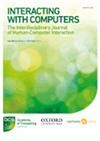解决协同设计项目中的价值:从敏感环境中的两个案例研究中吸取的教训
IF 1.3
4区 计算机科学
Q3 COMPUTER SCIENCE, CYBERNETICS
引用次数: 1
摘要
人机交互(HCI)学者和其他人主张将设计视为不可避免地涉及政治和伦理敏感性。这些考虑因素的一个子集是试图通过“价值敏感性”来处理利益相关者经常发生冲突的利益。以价值敏感设计(VSD)为灵感,我们强调了所讨论的价值观的演变背景塑造我们研究合作的必要方式。本文对长期以用户为中心的设计项目中的两个案例进行了回顾性分析,这两个项目都致力于价值驱动的HCI研究,并关注解放和赋权。第一个项目是一个为期三年的项目,明确致力于女性参与的女权主义政策倡议,旨在培养两性平等的价值观。第二个项目是一个为期4年的项目,涉及老年人的HCI研究,开发了一个用于拼车和公共交通的多式联运平台。我们展示了我们如何将一般承诺转化为务实、共同设计的研究目标和基础设施。我们努力的长期雄心和广泛的利益相关者基础的整合对支持这一点至关重要。此外,我们还深入了解了我们的方法如何在将方法适应特定环境时为可靠的协作和灵活性提供安全空间。本文章由计算机程序翻译,如有差异,请以英文原文为准。
Addressing Values in Co-Design Projects: Lessons Learned From Two Case Studies in Sensitive Contexts
Human–computer interaction (HCI) scholars and others have advocated treating design as inevitably implicating political and ethical sensitivities. A subset of those considerations has been the attempt to deal with the often conflicting interests of stakeholders through ‘value sensitivity’. Drawing on value-sensitive design (VSD) as an inspiration, we emphasize the necessary way in which the evolving contextuality of the values in question shaped our research collaborations. This paper presents a retrospective analysis of two case studies from long-term user-centered design projects in fields with explicit ambitions for value-driven HCI research and concerned with emancipation and empowerment. The first, a 3-year project, entailed an explicit commitment to feminist policy initiatives with female participants that aimed at fostering values of gender equality. The second, a 4-year project, dealt with HCI research with and for older adults, where a multimodal mobility platform for ridesharing and public transportation was developed. We show how we translated general commitment into pragmatic, co-design research goals and infrastructures. The long-term ambition of our endeavors and integration of a broad stakeholder base were vital to support this. We additionally provide insights into how our approach offered safe spaces for trustful collaboration and flexibility when adapting methods to specific contexts.
求助全文
通过发布文献求助,成功后即可免费获取论文全文。
去求助
来源期刊

Interacting with Computers
工程技术-计算机:控制论
CiteScore
2.70
自引率
0.00%
发文量
12
审稿时长
>12 weeks
期刊介绍:
Interacting with Computers: The Interdisciplinary Journal of Human-Computer Interaction, is an official publication of BCS, The Chartered Institute for IT and the Interaction Specialist Group .
Interacting with Computers (IwC) was launched in 1987 by interaction to provide access to the results of research in the field of Human-Computer Interaction (HCI) - an increasingly crucial discipline within the Computer, Information, and Design Sciences. Now one of the most highly rated journals in the field, IwC has a strong and growing Impact Factor, and a high ranking and excellent indices (h-index, SNIP, SJR).
 求助内容:
求助内容: 应助结果提醒方式:
应助结果提醒方式:


